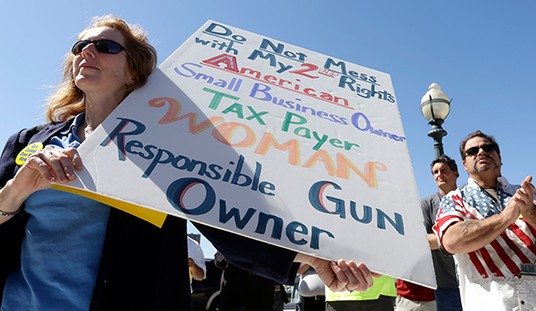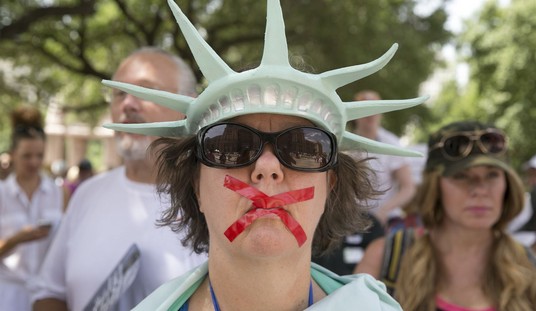The federal lawsuit filed by Illinois resident and school superintendent candidate Elizabeth Caparelli-Ruff isn’t technically a Second Amendment case, even though the litigation wouldn’t exist were it not for a firearm; specifically, a gun that Caparelli-Ruff raffled off as part of her campaign for regional superintendent of the Will County, Illinois school district.
Instead, Caparelli-Ruff and her attorneys allege it was her First Amendment rights that were violated when she was summarily dismissed from her position with the East Aurora School District 131 Board of Education last year after posting about her campaign-related gun raffle on Facebook. Caparelli-Ruff says after the school board got wind of the posting she was terminated from her position without notice, and just days after she and the board had renewed her contract.
U.S. District Judge John Robert Blakey, appointed to the bench by Barack Obama in 2014, has largely sided with Caparelli-Ruff in a ruling that allows her lawsuit against the school board to proceed. In his order, released late last week and highlighted by UCLA law professor Eugene Volokh at Reason’s Volokh Conspiracy lawblog, Blakey rejected the school board’s request to dismiss her complaint and instead found that Caparelli-Ruff’s former employer likely violated her First Amendment rights and retaliated against her protected speech. From the opinion (warning… we’re about to get into a few legal weeds here):
For a public employee’s speech to be protected under the First Amendment, the employee must show that: (1) she made the speech as a private citizen; (2) the speech addressed a matter of public concern; and (3) her interests under the First Amendment were not outweighed by the state’s interests as an employer in ‘promoting effective and efficient public service.’
The parties do not dispute that, in posting to Facebook, Plaintiff was speaking as a citizen rather than in her capacity as an employee. Thus, the Court turns to the question of whether Plaintiff’s speech addressed a matter of public concern. If Plaintiff can cross this legal threshold, Pickering v. Board of Educ. of Township High Sch. Dist. 205 requires the Court to balance the interests of the plaintiff, “as a citizen, commenting on matters of public concern,” against the interests of the municipality, “as an employer, in promoting the efficiency of the public services it performs through its employees.”
As the Seventh Circuit explained in Harnishfeger v. United States, “there are at least two routes to Pickering balancing.” The first requires the employee to establish that she spoke as a citizen rather than as an employee, and that she spoke on a matter of public concern rather than “matters only of personal interest,” see Connick v. Myers, 461 U.S. 138, 147 (1983). When an employee’s speech “is neither at work nor about work, however, a different path to Pickering is available.”
Under United States v. National Treasury Employees Union, speech made “outside the workplace,” which involves “content largely unrelated” to government employment, and which “is addressed to a public audience,” or involves “any matter for which there is potentially a public,” crosses the initial “matter of public concern” threshold and Pickering balancing applies. But if an employer can show that the employee took “deliberate steps” to link the speech to the employer’s mission, purpose, or image, then Connick, not NTEU, controls.
In briefing, Plaintiff argues that her speech (as part of a campaign in another county) was utterly unrelated to her employment with the Board. The facts in the Complaint do not conclusively determine that this is the case. Thus, at this early stage, the Court cannot yet determine which test applies.
Under NTEU, the question is merely whether Plaintiff’s speech is “addressed to a public audience.” Given Plaintiff’s allegations that the Facebook post served as a campaign advertisement, her speech meets this threshold.
Alternatively, to determine whether speech can fairly be characterized as touching upon a matter of public concern under Connick, the Court must evaluate the “content, form, and context of a given statement, as revealed by the whole record,” and resolve whether the speech is related “to any matter of political, social, or other concern to the community.”
According to Defendants, Plaintiff’s “social media post was not a matter of public concern protected by the First Amendment,” and was instead, “about raising money for her own concerns,” “related to her personal campaign to find another job.” In some sense, perhaps, every politician’s run for elected office constitutes a “campaign to find another job.” But a speaker’s private interest does not preclude the possibility that the speech also touches upon a matter of public concern— Defendants’ argument would have merit only if they could show Plaintiff’s speech was purely a private matter. Here, the Complaint alleges that the Facebook post served as a fundraising effort for Plaintiff’s political campaign for Regional Superintendent of Schools for Will County. Defendants have presented no basis to distinguish Plaintiff’s speech from other campaign-related speech, which generally meets the “public concern” standard.
The Court thus finds, for purposes of the motion to dismiss, that whether NTEU or Connick ultimately controls, Plaintiff has plausibly alleged speech that comes under the First Amendment’s protection. Defendants also argue that, even if Plaintiff’s speech did touch upon a matter of public concern, it remains unprotected by the First Amendment because, as a matter of law, Plaintiff’s free speech interests are outweighed by the Board’s interests in promoting “an efficient, disruption-free workplace.
No matter what legal test Blakey used, in other words, Caparelli-Ruff’s Facebook post appears to be protected speech.
The school board that fired her claimed in its own legal filings that the post about the gun raffle “could hinder the efficiency in the School District’s ability to provide an educational environment without disruption at a time of national mourning,” referring to the murders at Robb Elementary in Uvalde, Texas that had taken place a few days before her Facebook post went live. Blakey didn’t find that argument compelling in the slightest, opining that the “argument, which attempts to draw an ill-defined connection between a lawful gun raffle hosted on social media, and obviously tragic and unlawful mass shootings at schools, remains predicated upon numerous, dubious inferences drawn in Defendants’ favor—if not upon rank speculation,” adding that the argument provides an “insufficient basis for dismissal.”
Blakey’s ruling doesn’t guarantee that the case will ultimately be decided in favor of Caparelli-Ruff, but it does allow the case to move forward over the school board’s objections. The candidate is on solid legal footing in her arguments that the board violated her First Amendment right to support the Second Amendment and raise money for her campaign at the same time, and hopefully Blakey’s decision will be food for thought for any other Illinois school board that seeks to punish its employees for daring to embrace the right to keep and bear arms.










Join the conversation as a VIP Member